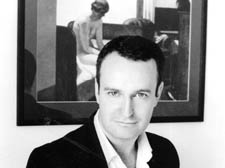
Andrew O'Hagan |
A writer with the child in his eyes
Booker-listed author Andrew O'Hagan is agin fascinated by the mob mentality, writes Sunita Rappai
ANDREW O’Hagan’s life could form the plotline for one of his own award-winning books: a witty, literate dissection of how a boy from a rough housing estate in Glasgow ends up a potential Booker-prize winning author in Primrose Hill.
Although there might be too few mishaps along the way, at first glance, to add the necessary dose of drama. His life, on superficial inspection, seems remarkably smooth – too linear for the kind of clever, contemporary novel he specialises in.
He may have grown up in a house without books but that was no obstacle for the self-confessed “bibliophile” – the son of a carpenter and cleaner – who relied on the local library for his weekly fix.
And he may have been the first person in his family to go to university but, with his first book, The Missing, published to great acclaim at the tender age of 24, the Scottish boy from the sticks seemed to make the transition to the top echelons of London’s glitterati seamlessly.
In person, O’Hagan does nothing to dispel the illusion of living a rather charmed life. He lives in a beautiful house in a part of Primrose Hill favoured by the lit-crit crowd with long-term partner India Knight – a columnist for the Sunday Times – and their year-old daughter.
His latest book, Be Near Me, has come out to his customary glowing reviews and it has just been nominated for the Booker, perhaps the most prestigious literary prize in the country.
To his credit, O’Hagan, despite the praise heaped upon him, is warm, candid and refreshingly down to earth. But scratch the surface and there is no doubt that his childhood – more Lord of the Flies than Just William – had a lasting impact.
The Missing, a searing study of children who disappear was inspired by the terrible murder of James Bulger in 1993 and the stories of other lost childhoods – and it brought back painful memories of his own childhood.
“There was something about that case that no one was getting right,” he says. “There was something very typical about the little boys that had committed that terrible crime – something about their way of leaning into each other, dodging school in the afternoon to walk about the shopping mall, the clothes they wore, the way they spoke.
“It became a very personal piece because I realised that what I was actually saying was that their childhoods were very like mine. I grew up in a housing estate that was very like theirs.
“I was involved in a certain amount of childhood violence and brutality which, though a much lesser form of what they did, was enacted in the same world, same circumstances. And I felt no one was making a liberal argument if you like.”
The compulsion to make a liberal argument has stayed with him ever since – together with a lasting hatred of the kind of mob mentality he saw at the James Bulger trial, a theme which has echoed through all his books since.
Be Near Me, his third novel, after Our Fathers and Personality, tells the story of an English priest, Father David, who takes over a small Scottish parish and finds himself clashing with the community after forming an ill-advised relationship with two local youths.
“The community rises up against him, then they feel vindicated when he seems to have done something very wrong,” he says. “That mob attitude runs through all my books. I don’t intend it to be that way – it just ends up that way.
“There is that sense of communities sort of fracturing – the idea that what binds some communities together is their hatred of outsiders which I consider to be a really upsetting modern phenomenon. You’re sharing a community experience of hate and I think the tabloids distil that hatred and that kind of atmosphere in a really disturbing way now.”
The blurring of lines between fiction and non-fiction, between real events and imagined, also pervades all his books to some degree. Unlike some novelists who seem to write from inside their heads, O’Hagan’s writing is rooted in a strong interest in the world around him.
Unsurprisingly, when you find out that his literary heroes were the great American gonzo journalists of the 1960s, giants like Norman Mailer and Truman Capote who tried to break down arbitrary distinctions between fact and fiction.
“I read In Cold Blood (Truman Capote’s seminal 1960s book about a murder in Kansas) with an enormous sense of artistic pleasure because I felt it was waking me up as a writer,” he says.
“It gave me such a sense of what one could do as a stylist. That it wasn’t just about facts or the imagination but about the way you could actually create a shape and a rhythm in writing that conveyed as much as the actual material itself.
“I happen to be devoted to writing novels but I’ve always had a strong reporter’s instinct also. I want to get out – I want to find out about things I don’t know and find a way to get inside them and describe them.”
Has it given him any answers, I ask him, any insights into the mysteries of the human condition that he’s willing to share?
“I don’t know that I have any answers,” he responds wryly. “Sometimes as a young writer what you’ve got is bags of questions and not so many answers. Maybe the rest of your career is about trying to provide the answers.”
CLICK BELOW TO SEARCH FOR ACCOMODATION
|